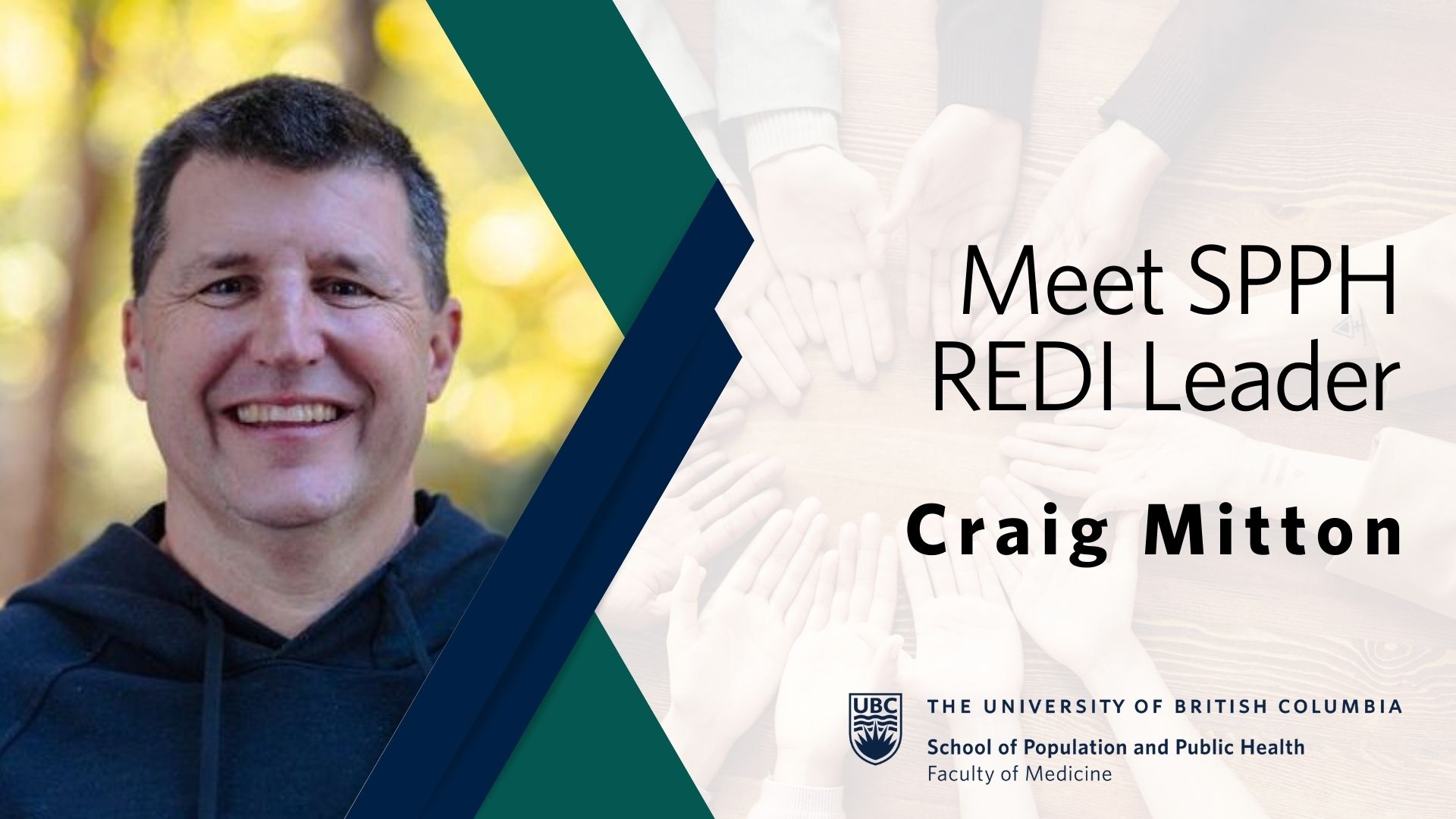
Meet SPPH REDI Leader: Craig Mitton
In this REDI Leader spotlight, we speak with Craig Mitton, Professor at the School of Population and Public Health.
Tell us about your background.
I was born and raised in Vancouver, graduated from high school in 1990, and went on to do various degrees at UBC and the University of Calgary. I was fortunate to get a two-year post-doctoral award, which included a year in Perth, Australia. Upon returning to Canada in 2004, I landed a grant tenure position in the then-named Department of Health Care and Epidemiology at UBC. From 2005-2009, I worked at UBC Okanagan, holding a Tier 2 CRC and Michael Smith Scholar award, and then in 2009, I took up a position at the Centre for Clinical Epidemiology and Evaluation and SPPH. I’ve been fortunate to hold a number of posts within SPPH and have thoroughly enjoyed working alongside amazing colleagues and students in the last 15 years. On the home front, I’ve been happily married for 28 years and my wife and I have two inspiring daughters aged 16 and 20. I love living in Vancouver and spending as much time as possible in, on or around the water.
What motivates you to engage in REDI work at SPPH?
I’ve always tried to put others first and try to build up those I interact with. Long before ‘equity, diversity and inclusion’ was part of the common vernacular, my desire has been to see other people do well in their circumstances and background. I sometimes fear that under a ‘REDI banner’ there’s a thought that everyone has to agree. To be honest, I find disagreement freeing, but we have to figure out how to disagree ‘well’, as in respectfully and without demeaning someone for their differing views. On a positive note, I’ve been super encouraged by some of the exciting initiatives at SPPH, including work on admissions and curriculum.
Can you share a project, program, teaching/education and/or research initiative(s) that you have been involved in that promotes REDI at SPPH?
Over the past couple years, I’ve been working on community engagement at SPPH and part of this role has led to involvement in two faculty recruitments for Indigenous scholars. I was introduced through one of my faculty colleagues to an Indigenous woman from the Musqueam First Nation who I got to know through quite a few meetings related to our recruitment process. She talked about growing up in Vancouver, playing in the forest and by the ocean and spending time in nature and how that shaped who she was. It got me thinking of my own love of nature and how that surely has shaped who I am. She also said some pretty profound things about how we needed to make sure we hired more Indigenous people at SPPH and how UBC and Musqueam haven’t had a great relationship in part because UBC (as a whole) hasn’t reached out to Musqueam even though we’re on their land. I said that I can’t change UBC, but I’m really glad that we’re talking and that I know many others at SPPH want to talk and learn as well. I hope those of us at SPPH can form more relationships with those in Musqueam and build trust over time.
What role do you see yourself playing in improving REDI at SPPH?
Perhaps we should spend more time calling a spade a spade and less time worrying about getting things perfectly right going forward. Life is messy and relationship building can be challenging. It takes time and dedicated effort. As one of my students from Nigeria said to me not that long ago, “Of course there’s racism in UBC that really shouldn’t surprise anyone.” I have so much to learn, and I really hope others want to learn and grow as well. I’m up for embracing change, having difficult conversations, accepting my own failings and humbly trying to do better.
What are some challenges you’ve faced in your REDI work, and how have you overcome them?
I’ve never worried about being in uncomfortable discussions and my own personality is to step into conflict and ‘talk it out’. What frustrates me, though, is this whole cancel culture we live in, where people don’t seem to be allowed to hold opposing views. This is one of the main reasons you won’t find me on social media. I find academia is one of the worst places these days for polarization, whereas in my mind, it should be a safe place to debate and not worry about being judged. I work hard not to judge people and to accept that where someone is coming from may be very different than my own place. It is critical to listen and seek to understand before speaking.
What advice do you have for those interested in getting involved in REDI initiatives at SPPH?
Listen to as many different viewpoints as you can without arguing or debating then think through those (differing) perspectives and ask yourself what are some of the concepts that you can actually live with (if not outright agree with) and then go back to those people and start a discussion about your points of agreement and build from there. It’s amazing how dis-arming agreeing with even a few points can be!
The REDI Leader feature is a space that highlights diverse voices of those leading educational reforms, research projects, and/or workplace initiatives at SPPH with the aim to foster a respectful, equitable, diverse, and inclusive environment. The perspectives shared are those of the individual(s) and do not necessarily reflect the views of UBC, SPPH or any of its constituent units.